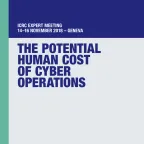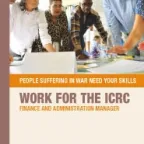Anaesthesia Handbook
The aim of this handbook is to provide guidance for trained anaesthetists working for the ICRC and to offer advice in areas where practice will differ from that in their home country. It is designed …
The aim of this handbook is to provide guidance for trained anaesthetists working for the ICRC and to offer advice in areas where practice will differ from that in their home country. It is designed …
This leaflet provides a brief overview of the ICRC’s Physical Rehabilitation Programme, which celebrated 40 years of existence in 2019. The Physical Rehabilitation Programme was created in 1979, with …
Safeguarding individuals’ personal data, particularly in challenging situations such as armed conflicts and other humanitarian emergencies, is an essential part of protecting people’s lives, dignity …
This poster raises awareness of the plight of missing people and their families through the use of a simple but powerful image and …

The CCHN Negotiator’s Notebook is designed for note-taking during meetings and includes fact sheets related to humanitarian negotiation and templates from the CCHN Field Manual on Frontline …

This report provides an account of the discussions that took place in November 2018 during a meeting of experts organized by the ICRC with the aim of moving towards a realistic assessment of the …

The CCHN Negotiator’s Handbook offers a collection of updated CCHN tools for direct use in today’s negotiation processes. It outlines how to apply each tool in the CCHN Field Manual on Frontline …
This publication is intended as a practical manual for governments, hospital managers and others concerned, with a view to helping them prepare for and manage situations that could jeopardize their …
The ICRC is always looking for talented HR and finance professionals willing to lend their skills to our humanitarian cause. This leaflet details the profiles we are looking for and the challenges …

An overview of the ICRC’s health programmes on the ground and the principles underpinning them. Treating and caring for the wounded and sick in armed conflict, other major violence and natural …
Try one of the following resources:
Created in 1863, the ICRC library, alongside the ICRC archives, provides an indispensable documentary reference on the organization itself and international humanitarian law.
International humanitarian law is based on a number of treaties, in particular the Geneva Conventions of 1949 and their Additional Protocols, and a series of other instruments.
Customary international humanitarian law consists of rules that come from "a general practice accepted as law" and that exist independent of treaty law.